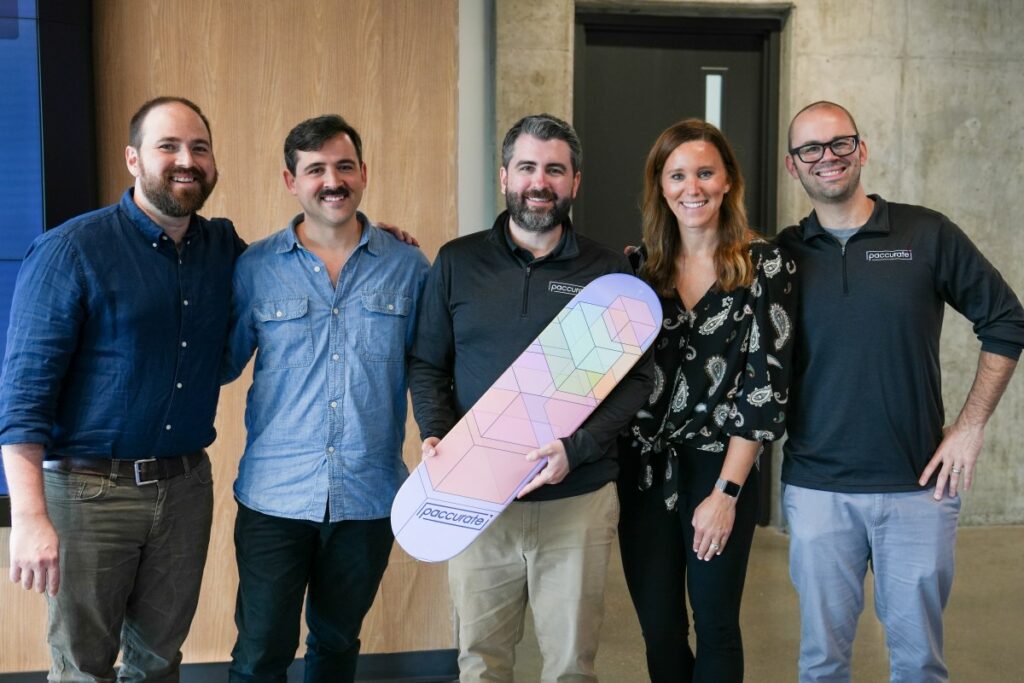Paccurate co-founder and CEO James Malley likes to joke that once you get into supply chain tech, the category doesn’t let you back out.
Ten years ago, Malley and Patrick Powers were working together as consultants when they started getting asked the same question over and over. Their clients were asking for help reducing the empty space in their packaging boxes to avoid newly implemented fees from shippers like FedEx and UPS. Malley and Powers couldn’t find good software that solved that issue and started looking into solving the problem themselves.
“We had a fascination with the butterfly effect of this problem area,” Malley told TechCrunch. “The more tweaks you make to packaging, the bigger the downstream. If you use a 10% smaller box, on average it results in 10% fewer pallets and 10% fewer truck trips. It’s also one of the few areas in supply chain where sustainability and cost savings are the same exact thing.”
After a few years of research and development, they formally launched Paccurate in 2018. The software helps parcel shippers determine the most cost-effective and sustainable way to ship the items they need to, a process known as cartonization, by taking factors such as size, weight, and packaging requirements into account. Brands can also use Paccurate’s API to build systems themselves.
Cartonization is often embedded into other supply chain software, Malley said, but a lot of companies don’t trust it. He said that some services just aren’t accurate while others are focused on helping companies get as much product into as few boxes as possible, which isn’t actually always the most sustainable or cost-efficient option, Malley said.
When Malley and Powers launched the business, they thought of it as “building a better mouse trap” tech not necessarily a venture-scalable company. Malley said the company was content to just bootstrap Paccurate and license the tech to other software companies until the pandemic changed the company’s plans.
But Paccurate got flooded with new and larger customers during the Covid e-commerce boom, so the startup started taking venture funding, taking a seed round in 2022 to keep up with demand. Growth has only accelerated since. Last year the company was processing about a million shipments a month, now it’s around a million shipments a day and Paccurate is working with brands like Daily Harvest and Our Place.
Paccurate recently raised a $8.1 million Series A round led by Indianapolis-based VC High Alpha, with participation from Tech Square Ventures, Grand Ventures and Springtime Ventures, among others.
This type of logistics is still largely dominated by legacy supply chain software players like the Numina Group and Packsize. While Paccurate isn’t the only startup building for this area — Belgian company Optioryx is another — it’s a significantly less saturated market than many other areas of supply chain, like last-mile freight.
Malley said they anticipate growth will continue for a few reasons. For one, Malley said that it’s one of the few areas where companies can actually cut costs when it comes to warehousing and shipping. He added that for years, companies seemed focused on bringing automation and robotics into the warehouse to cut costs, now many have turned to this area, he said.
Second, regulations will soon force companies to think more about how they are packaging. The European Union recently implemented regulations requiring shipping boxes to be at least 50% full. In the U.S., New Jersey introduced a bill earlier this year that would also require boxes to be at least half full; the bill has passed through the state senate.
“Well-packed boxes are generally not as full as you think they are, 50% empty could be a box that is well-packed and the penalities for not packaging correctly are staggering,” Malley said. “This is a canary in the coal mine. I’ll be watching closely to see which state will be next “


